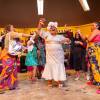The children's book "Runaway" tells the story of Ona Judge, a young woman enslaved by President George Washington and his wife, Martha Washington. Author Ray Anthony Shepard and illustrator Keith Mallett tell the story of her escape and self-emancipation in the form of a poem, repeating the refrain "Why you run, Ona Judge?" Shepard joined GBH's Morning Edition hosts Paris Alston and Jeremy Siegel to talk about the book ahead of Juneteenth. This transcript has been edited for clarity and length.
As a bonus, click the listen button above to hear GBH's Under the Radar host Callie Crossley read an excerpt from the story.
Jeremy Siegel: The book "Runaway" is the story of Ona Judge, an African American woman born into slavery and enslaved by Martha and George Washington, who risked her life and comfortable living to emancipate herself by running away to Portsmouth, New Hampshire.
So to get started, Ray, tell us a little bit about why you wanted to write this book.
More Music & Culture
Ray Anthony Shepard: When I retired from educational publishing some 10 years ago, I decided I wanted to begin an encore career, writing about the Black experience for children or young adults. My second book, "Runaway," is the story of Ona Judge, is the story of someone who had the best job a slave could have. And it wasn't enough. Still, this desire for liberty, this desire for freedom, the desire to be your own person was greater than being a special slave to the most powerful couple in America. And she chose the hardscrabble life of a fugitive in New Hampshire as opposed to being a privileged slave for the Washingtons.
Paris Alston: Tell us more about Ona Judge. Who is she? What was her life like?
Shepard: Ona was born in Mount Vernon either in 1793 or 1794. Her father was an English indentured servant who worked in Mount Vernon for four to seven years. Her mother was a seamstress for Martha. And at age 10, Ona became a full-time seamstress, an apprentice, if you like. And at age 16, when George Washington moved to New York to become president of the new country, Martha took Ona to New York and then eventually Philadelphia when the capital moved there. And it was there, at age 23, after 23 years of being enslaved, she decided, with the help of Black and white abolitionists, to escape, to exercise her own desire for freedom. Sometimes I referred to it as she stole herself, in spite of the fact that George Washington made two attempts to kidnap her and return her to Mount Vernon.
"The internal drive for freedom or liberty is greater than any material wealth."-Ray Anthony Shepard, author of 'Runaway'
Siegel: Throughout this poem, you repeat the question, "Why you run, Ona Judge?" Why is a rhetorical question like that so central to this story?
Shepard: Well, I think if you have the most privileged — you have the best job a slave can have, "why you run, Ona Judge?" And imagine you're a field hand and you're working 12, 14 hours a day in the hot sun under harsh conditions. And you see this very attractive young woman who has clean and very nice clothes, and is treated well. And then one day you hear that she escaped. "Why you run, Ona Judge?"
Siegel: We're having this conversation ahead of Juneteenth, the day that many school kids will have off. Why do you think a story like this is important and significant for children to hear? You know, in understanding and embracing Juneteenth?
Shepard: Well, there are a couple of major ways to understand Juneteenth. One, it benchmarks our progress as a country, striving, struggling — a struggle that still continues — to become a multiracial, multiethnic democracy. And we have to understand that those enslaved people who could, emancipated themselves. Or those who attempted and failed. Here's someone who has it all. But the internal drive for freedom or liberty is greater than any material wealth.
Click the listen button above to hear GBH's Under the Radar host Callie Crossley read an excerpt from the story. The reading begins around 4:41.











